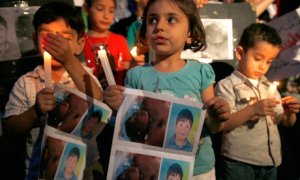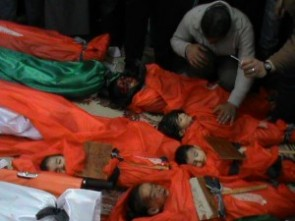Our Children in Syria
WRITTEN BY Asmae Dachan, translated by Mary Rizzo
Every parent would like to buy their own children toys so that they can play, books so that they can get an education, clothes and shoes to wear, food and drink for their nourishment. They would like to smile while they get out of bed during the night to check on their children as they sleep in their room, tucking them in well under their covers; wake them up in the morning, help them get ready, bring them to school, kiss them goodbye and then embrace them again when they return from work, sit beside them on the sofa, listen to them tell about their day, watch their eyes light up when they are excited, look through their notebooks with them to see what they are learning, hugging them tightly, watch a film with them…
These are scenes from daily life: you may be asking yourself why I have used a conditional mode for this text. Because in Syria, for 11 months, none of these things exist any longer. In Syria, it has been exactly the love of freedom of a group of children from the city of Dar’à who wrote on a wall of their school “The people want the fall of the regime” to cause the repression and wicked violence of the bloody regime, which has been in power for over 40 years. In Syria, for 11 months, unarmed civilians are suffering unspeakable violence, they are under the guns of snipers and their homes shelled by armoured tanks. To this day, there are over 7,000 dead, among them, 400 children! Children who have been torn away from life, from the love of their families, their relatives, their friends. Children who have been deprived of the right to play, dream, grow.
More than 400 flowers cut by the criminal hands of the dictator Assad and his militia. More than 400 little voices who filled the lives and homes of their mothers and fathers, the classes of their schools, the streets of their towns, the gardens and playgrounds and now have been silenced forever. More than 400 innocent victims full of love and curious to discover life, who today sleep eternally. More than 400 tiny souls who will always remain in the hearts and the memories of those who loved them, including the other children with whom they shared the days in school or the afternoons of play. 400 times “goodbye” to these pure angels.
Their stories burn in our souls as if we are being branded. Our children in Syria know what it means to be tortured, they know what it means to die on account of an infection, from a bullet that penetrates their bodies, from a grenade launched against the homes they live in. Our children in Syria have learned what it means to spend days without eating and drinking, they know what it means to die from the cold, since the regime with determination cut the electricity and the gas, and they prohibited the inhabited centres in the zones of the protests from being supplied with these basic necessities. In Syria our children know what it means to see their own mother or father die before their eyes, they know what it means to look fear in the eyes…
Today in Syria parents are forced to buy shrouds for their children, and when it is not possible, they give them the final farewell wrapping them in their own blankets.
What kind of humanity can accept all of this?
In Syria our children die twice: The first time at the hands of the regime, the second time on account of the world’s indifference!
Do not be accomplices in this slaughter of innocents!
The Martyrdom of Syrian Children WITH VIDEO
WRITTEN BY SHADY HAMADI, translated by Mary Rizzo
The week that has just ended has been the bloodiest since the start of the Syrian uprising. At least 66 killed yesterday alone, as reported by activists in Syria. The regime of Damascus has started a violent offensive against the Free Syrian Army (FSA) and the protesters: the deaths come from each one of these groups. The Syrian Foreign Minister Mohammed Ibrahim al Chaar has declared, by means of the official SANA news agency that, “the regime is determined to re-establish order and security and to clean the territory of its criminals.”
In the suburbs of Saqba and Zabadani, which are now under the control of the FSA, there are equally heavy attacks from the regime underway, which aim at regaining control, not only of these two zones, but of the entire band of suburbs surrounding the capital. The Arab League, due to the escalation of the violence, has ended their observers mission. Nabil al Arabi, secretary of the Arab League, has flown to New York in order to United Nations’ support for a plan of peaceful transition of power.
What is now in Syria becoming a true war of liberation encloses one tragedy in another: it is that of the Syrian children who have become involuntary protagonists in a revolution that is robbing their innocence from them. More than 400 children have died from violence since the beginning of the protests.
Hamza al-Khatib, born in October 1997 in Jiza, in the Daraa province, was arrested on 29 April in a checkpoint, while he was going to Daraa with other persons to bring aid to the citizens under siege by the Syrian regular militia. The body of the child was brought to his family completely mutilated, his penis was cut off, and bearing many other signs of torture, he had gunshot wounds on his limbs and chest.
Tamer Mohammad al-Sharey, 15 years old, he was arrested together with Hamza al-Khatib and like him, he died under torture; his teeth were pulled out of his mouth while he was alive, they gouged out his eyes and shot him in the legs, stomach and face. Signs of cigarette burns were found on every part of his body.
And several days ago was the terrible massacre of children in the village of Hasal al Wuard. Eleven components of the Bahado family were executed by the regime’s “security forces” and among the victims, five children. How long will mankind be attracted to evil, How long will be keep accepting that all of this happens?
Original http://www.ilfattoquotidiano.it/2012/01/30/martirio-bambini-siriani/187597/










